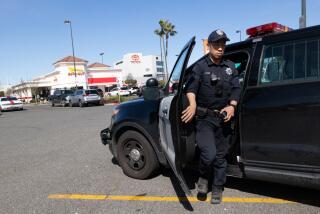Emergencies can be a moving target for CHP dispatchers
- Share via
As Jennifer O’Donnell rolled to a stop at the red light, the driver in the car behind her jumped out and stormed toward her.
He appeared to be a gaunt man, with a bandanna partially covering his forehead. O’Donnell, a college student, told her friend to lock the doors as the other driver, furious about being cut off, made obscene gestures outside her window.
O’Donnell gunned her engine when the signal changed, then heard a thud, she recently recalled. The driver had thrown something and was back at the wheel of the other car, chasing her. Terrified, O’Donnell dialed 911 on her cellphone as she maneuvered through unfamiliar streets.
A California Highway Patrol dispatcher picked up and asked what city she was in.
O’Donnell didn’t know; she was visiting the area. It could have been Long Beach, maybe Signal Hill.
The dispatcher kept asking -- for a business name, an address, the license plate number on the car, anything to help route her call to the proper authorities.
“I’m being chased. . . . I’m trying to stay alive,” she recalled telling the operator as she made quick turns, trying to circle back toward an area she knew was in Long Beach.
As the 2005 incident illustrated, emergency operators can’t necessarily track a wireless caller who is traveling and doesn’t know his or her location.
“She’s a moving individual, so it’s difficult to narrow down,” said CHP Capt. Tommi L. Tyler, commander of the agency’s Los Angeles dispatch center.
The CHP handles more than 70% of cellphone 911 calls in California, many of which must be transferred to local police and fire agencies before help can be dispatched. When computerized tracking information is unavailable, CHP dispatchers must rely on callers -- who may be distraught, unable to speak or accidentally disconnected -- to help them figure out the jurisdiction in which the emergency has occurred.
In O’Donnell’s case, her pursuer gave up and turned away after several chilling minutes. What, if any, location data came in with O’Donnell’s call couldn’t be determined because records from the period had been lost, CHP officials said.
Whatever the technical issues, O’Donnell’s faith in the wireless 911 system was shaken.
“In Southern California, there’s a lot of mobility,” she said. “People travel 50 miles. Should they have to know every city boundary?”
--
rich.connell@latimes.com
More to Read
Sign up for Essential California
The most important California stories and recommendations in your inbox every morning.
You may occasionally receive promotional content from the Los Angeles Times.














